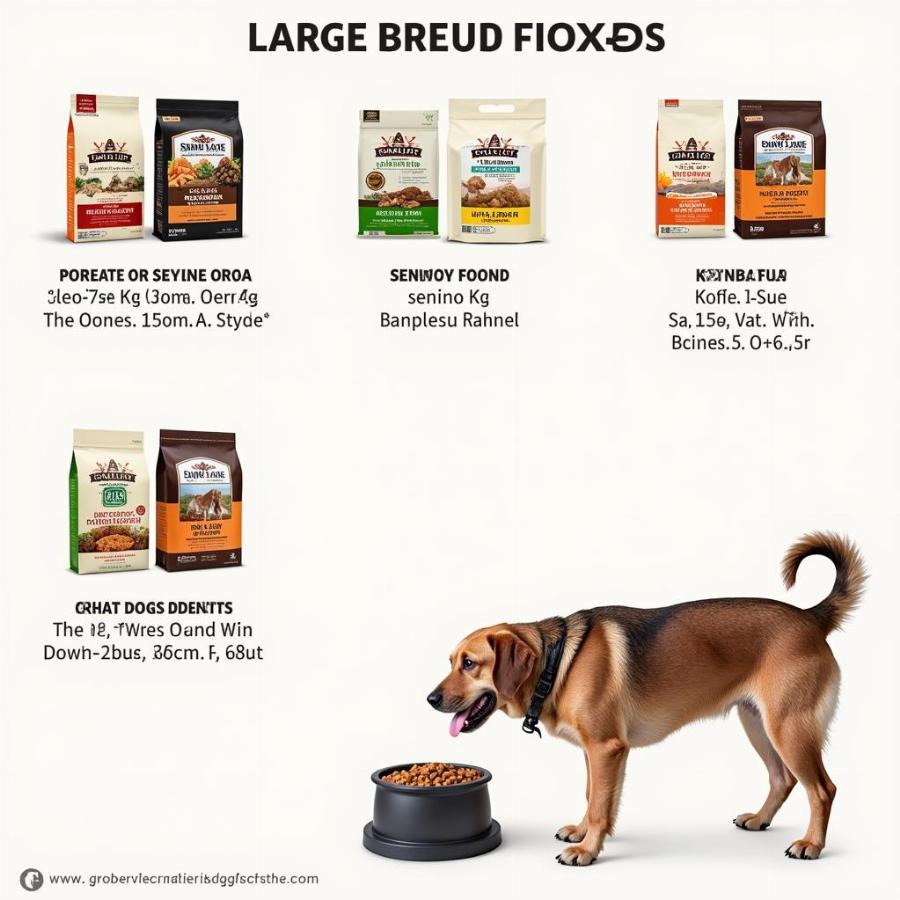Choosing the right senior dog food for your large breed companion is a crucial step in ensuring their health and happiness during their golden years. Large breed senior dogs have unique nutritional needs compared to their younger counterparts and smaller breeds. Providing them with a diet specifically formulated for their age and size can help manage age-related health issues, maintain a healthy weight, and support their overall well-being. This comprehensive guide will delve into the essential factors to consider when selecting the best senior dog food for large breeds, empowering you to make informed decisions for your beloved furry friend.
Understanding the Needs of Senior Large Breed Dogs
As large breed dogs age, their metabolism slows down, and they become less active. This means they require fewer calories to maintain a healthy weight. However, their nutritional needs change, requiring a different balance of protein, fat, and other essential nutrients. Common health concerns in senior large breed dogs include joint problems like arthritis, hip dysplasia, and mobility issues. They are also more prone to digestive problems and may experience a decline in cognitive function.  Choosing food for senior large dogs
Choosing food for senior large dogs
Key Nutritional Considerations for Senior Large Breed Dog Food
Protein:
While senior dogs need less protein than puppies, it remains crucial for maintaining muscle mass and overall health. Look for senior dog food with high-quality, easily digestible protein sources like chicken, fish, or lamb.
Fat:
Healthy fats are essential for providing energy, supporting skin and coat health, and aiding in the absorption of fat-soluble vitamins. Choose a senior dog food with moderate fat content from sources like fish oil or flaxseed, which are rich in omega-3 fatty acids.
Fiber:
Adequate fiber intake helps regulate digestion and prevent constipation, a common issue in senior dogs. Look for senior dog food with a good balance of soluble and insoluble fiber.
Joint Support:
Large breed dogs are particularly susceptible to joint problems. Senior dog food often includes ingredients like glucosamine and chondroitin to support joint health and mobility.
Choosing the Right Kibble Size and Texture
Large breed senior dogs may have difficulty chewing smaller kibble. Opt for larger kibble sizes or softer textures that are easier to chew and digest. dogs eating egg shells This can help prevent choking and ensure they receive proper nutrition.
How Much to Feed Your Senior Large Breed Dog?
The amount of food you should feed your senior large breed dog depends on several factors, including their age, activity level, and overall health. Consult your veterinarian for personalized feeding recommendations. Overfeeding can lead to obesity, which exacerbates joint problems and other health issues.
Reading the Label and Avoiding Common Mistakes
Carefully examine the ingredient list and guaranteed analysis on the dog food label. Avoid foods with fillers, artificial colors, flavors, and preservatives. Look for the Association of American Feed Control Officials (AAFCO) statement to ensure the food meets nutritional standards. elevated dog bowls for small dogs A common mistake is switching food too quickly. Introduce new food gradually over several days to avoid digestive upset.
What are the signs my large breed dog needs senior food?
Changes in activity level, weight gain or loss, and changes in coat quality can be indicators that your dog is ready for senior food.
How can I transition my large breed dog to senior food?
Gradually mix the new senior food with their current food, increasing the proportion of senior food over several days.
What if my large breed senior dog is a picky eater?
Try different flavors and textures of senior dog food or add warm water or low-sodium broth to make the food more appealing. best dog food for dobermans
Expert Insight
Dr. Emily Carter, DVM, emphasizes the importance of choosing a senior dog food tailored to large breeds:
“Large breeds age differently, and their nutritional needs reflect this. A diet rich in high-quality protein, moderate fat, and joint-supporting ingredients is essential for maintaining their health and mobility.”
Dr. Robert Miller, PhD in Animal Nutrition, adds:
“Senior large breed dogs often benefit from a diet lower in calories but higher in fiber to maintain a healthy weight and digestive system.”
Conclusion
Choosing the right senior dog food for your large breed companion is a vital investment in their long-term health and happiness. By understanding their unique nutritional needs and carefully considering the factors outlined in this guide, you can help your gentle giant enjoy their golden years to the fullest. Remember to consult with your veterinarian for personalized recommendations. feeding syringe for dogs Finding the perfect senior dog food large breed formula may take some trial and error, but the rewards of seeing your furry friend thrive are well worth the effort.
FAQ:
- When should I switch my large breed dog to senior food? Typically around 7-8 years old, but consult your vet.
- What are the key ingredients to look for in senior dog food for large breeds? High-quality protein, moderate fat, glucosamine, chondroitin, and fiber.
- How can I help my large breed senior dog maintain a healthy weight? Feed the correct portion size and encourage regular, low-impact exercise.
- What are the signs of joint problems in senior large breed dogs? Stiffness, limping, difficulty getting up, and reluctance to exercise.
- What should I do if my large breed senior dog refuses to eat their new food? Try different flavors or add warm water or low-sodium broth.
- Can I give my senior large breed dog human food? Some human foods are safe for dogs, but consult your vet for specific recommendations.
- How often should I take my senior large breed dog to the vet? At least annually, but more frequently if they have any health concerns.